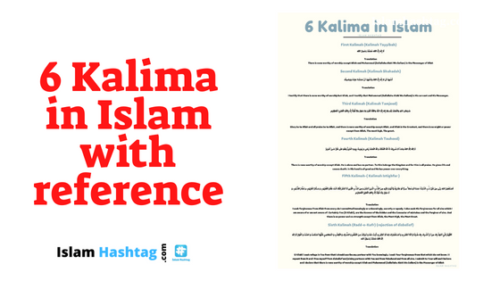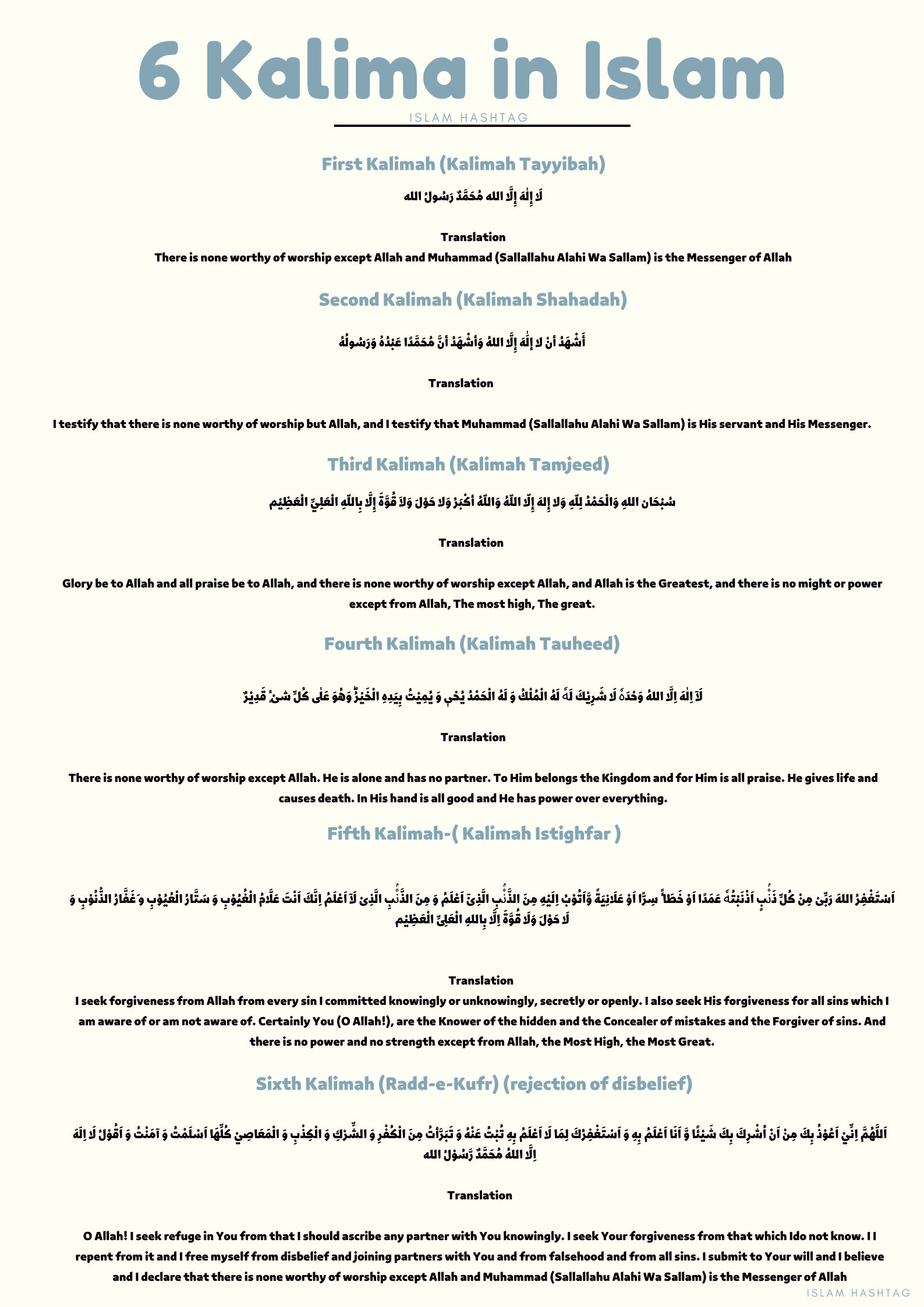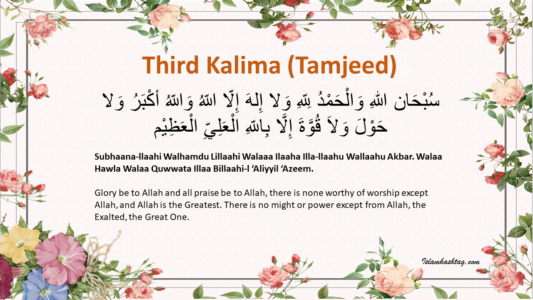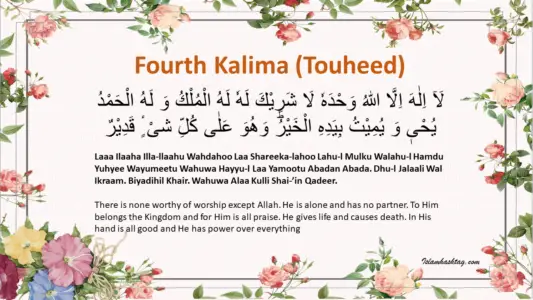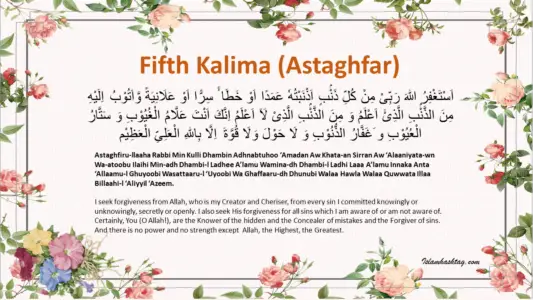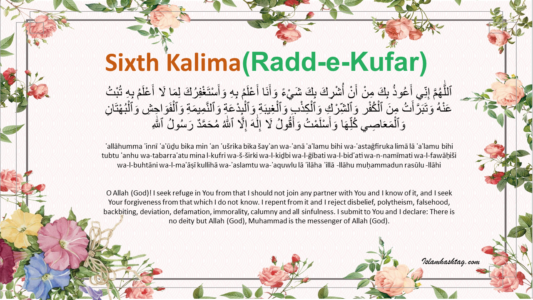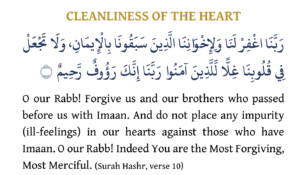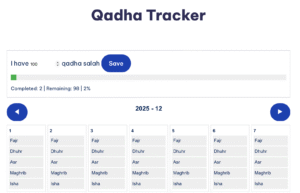Kalima in Islam-First kalima, Second kalima,Third Kalima, Fourth Kalima, Fifth Kalima
The kalima in Islam : Kalima are the core belief of a Muslim. Kalima are the foundation of Muslim belief and increases him in Iman.
The Six kalima with reference.
Let us read the six Kalima with english translation along with its reference. Studying something with reference increases the love and reverence towards a practice which we have been doing for ages. So here are the 6 kalima, hope it benefits.
Read : Essential of deen
This is an independent website by a Female scholar.If you benefit from our articles, Help our Projects by buying our Worksheets (Link1) or (Link2) or removing ads. Bookmark our website so that you can visit it daily for(Digital Tasbih) or (Salah Tracker).
1)First Kalimah (Kalimah Tayyibah):
لَا إِلٰهَ إِلَّا الله مُحَمَّدٌ رَسُولُ الله
First Kalima English
There is none worthy of worship except Allah and Muhammad (Sallallahu Alahi Wa Sallam) is the Messenger of Allah.
Reference of First kalima
It is stated in a Hadith,
قَالَ رَسُولُ اللهِ صَلَّى اللهُ عَلَيْهِ وَسَلَّمَ: ” أُمِرْتُ أَنْ أُقَاتِلَ النَّاسَ حَتَّى يَقُولُوا: لَا إِلَهَ إِلَّا اللهُ، فَمَنْ قَالَ: لَا إِلَهَ إِلَّا اللهُ، فَقَدْ عَصَمَ مِنِّي مَالَهُ، وَنَفْسَهُ، إِلَّا بِحَقِّهِ وَحِسَابُهُ عَلَى اللهِ
The Messenger of Allah (Sallallahu Alahi Wa Sallam) declared: I have been directed to fight against people so long as they do not say: La ilaaha illal-laah (There is no god but Allah). (Muslim; Chapter: The command to fight the people until they say “La ilaha illallah Muhammadur Rasulul-Allah”)1
2) Second Kalimah (Kalimah Shahadah):
أَشْهَدُ أنْ لا إلَٰهَ إِلَّا اللهُ وَأشْهَدُ أنَّ مُحَمَّدًا عَبْدُهُ وَرَسُولُهُ
2nd Kalima in English
I testify that there is none worthy of worship but Allah, and I testify that Muhammad (Sallallahu Alahi Wa Sallam) is His servant and His Messenger.
Reference of 2nd Kalima
It is stated in a Hadith,
قَالَ رَسُولُ اللهِ صَلَّى اللهُ عَلَيْهِ وَسَلَّمَ: ” مَنْ قَالَ: أَشْهَدُ أَنْ لَا إِلَهَ إِلَّا اللهُ وَحْدَهُ لَا شَرِيكَ لَهُ، وَأَنَّ مُحَمَّدًا عَبْدُهُ وَرَسُولُهُ، وَأَنَّ عِيسَى عَبْدُ اللهِ، وَابْنُ أَمَتِهِ، وَكَلِمَتُهُ أَلْقَاهَا إِلَى مَرْيَمَ وَرُوحٌ مِنْهُ، وَأَنَّ الْجَنَّةَ حَقٌّ، وَأَنَّ النَّارَ حَقٌّ، أَدْخَلَهُ اللهُ مِنْ أَيِّ أَبْوَابِ الْجَنَّةِ الثَّمَانِيَةِ شَاء
He who said: Ašhadu an lā ilāha illā-llāh waḥdahu lā šarīka lahu, wa ašhadu anna muḥammadan ʿabduhu wa rasūluh (There is no god but Allah, He is One and there is no associate with Him, that Muhammad (Sallallahu Alahi Wa Sallam) is his servant and His messenger),… Allah would make him (he who affirms these truths) enter Paradise through any one of its eight doors which he would like.(2)
3) 3rd Kalimah (Kalimah Tamjeed):
سُبْحَان اللهِ وَالْحَمْدُ لِلّهِ وَلا إِلهَ إِلّا اللّهُ وَاللّهُ أكْبَرُ وَلا حَوْلَ وَلاَ قُوَّةَ إِلَّا بِاللّهِ الْعَلِيِّ الْعَظِيْم
Translation of 3rd Kalimah English
Glory be to Allah and all praise be to Allah, and there is none worthy of worship except Allah, and Allah is the Greatest, and there is no might or power except from Allah, The most high, The great.
4) 4th Kalimah (Kalimah Tauheed):
لَآ اِلٰهَ اِلَّا اللهُ وَحْدَهٗ لَا شَرِيْكَ لَهٗ لَهُ الْمُلْكُ وَ لَهُ الْحَمْدُ يُحْىٖ وَ يُمِيْتُ بِيَدِهِ الْخَيْرُؕ وَهُوَ عَلٰى كُلِّ شیْ ٍٔ قَدِیْرٌ
Translation of 4th Kalimah ,
There is none worthy of worship except Allah. He is alone and has no partner. To Him belongs the Kingdom and for Him is all praise. He gives life and causes death. In His hand is all good and He has power over everything.
Reference of The 3rd and 4th Kalimas are taken from following Hadith,
عن رسول الله صلى الله عليه و سلم قال من تعار من الليل فقال لا إله إلا الله وحده لا شريك له له الملك وهو على كل شيء قدير وسبحان الله والحمد لله ولا إله إلا الله والله أكبر ولا حول ولا قوة إلا بالله ثم قال رب اغفر لي أو قال ثم دعا استجيب له فإن عزم فتوضأ ثم صلى قبلت صلاته
The Messenger of Allah Sallallahu Alahi Wa Sallam said: “Whoever wakes up in the night and say, (La Ilaha Illallah, Wahdahu La Sharika Lahu, Lahul-Mulku Wa Lahul-Hamdu, Wa Huwa ala Kulli Shai’in Qadir (None has the right to be worshipped but Allah, alone, without partner, to Him belongs the Dominion, and to Him is the praise, and He has power over all things.) And Subhan Allah, Walhamdullilah, Wa La Ilaha Illallah, Wa Allahu Akbar, Wa La Hawla Wa La Quwwata Illa Billah. (Glory is to Allah, and all the praise is to Allah, and ‘None has the right to be worshipped but Allah, and Allah is the greatest, and there is no might nor power except by Allah.)’ – then he says: Rabbighfirli (‘O my Lord, forgive me) then he supplicates, he shall be responded to.(3)
-Read Dua before study
5) 5th Kalimah-(Kalimah Istighfar )
Fifth Kalimah is a supplication (Dua) in disapproving of disbelief (kufr) and seeking protection of Allah from associating any partners with Him.
اَسْتَغْفِرُ اللهَ رَبِّىْ مِنْ كُلِّ ذَنْۢبٍ اَذْنَبْتُهٗ عَمَدًا اَوْ خَطَا ًٔ سِرًّا اَوْ عَلَانِيَةً وَّاَتُوْبُ اِلَيْهِ مِنَ الذَّنْۢبِ الَّذِیْٓ اَعْلَمُ وَ مِنَ الذَّنْۢبِ الَّذِىْ لَآ اَعْلَمُ اِنَّكَ اَنْتَ عَلَّامُ الْغُيُوْبِ وَ سَتَّارُ الْعُيُوْبِ و َغَفَّارُ الذُّنُوْبِ وَ لَا حَوْلَ وَلَا قُوَّةَ اِلَّا بِاللهِ الْعَلِىِّ الْعَظِيْم
Fifth Kalimah English
I seek forgiveness from Allah from every sin I committed knowingly or unknowingly, secretly or openly. I also seek His forgiveness for all sins which I am aware of or am not aware of. Certainly You (O Allah!), are the Knower of the hidden and the Concealer of mistakes and the Forgiver of sins. And there is no power and no strength except from Allah, the Most High, the Most Great.
Istigfaar(repentance) is emphasized upon in the following Hadith,
قالَ رَسُولُ اللهِ صَلَّى اللهُ عَلَيْهِ وَسَلَّمَ: «يَا أَيُّهَا النَّاسُ تُوبُوا إِلَى اللهِ، فَإِنِّي أَتُوبُ، فِي الْيَوْمِ إِلَيْهِ مِائَةَ، مَرَّةٍ
The Messenger of Allah (Sallallahu Alahi Wa Sallam) said: “O you people! Repent to Allah and seek His forgiveness. Truly I myself offer repentance one hundred times each day.” (Muslim 2702) 4
6) Sixth Kalimah (Radd-e-Kufr) (rejection of disbelief).
اَللَّهُمَّ اِنِّيْ اَعُوْذُ بِكَ مِنْ اَنْ اُشْرِكَ بِكَ شَيْئًا وَّ اَنَا اَعْلَمُ بِهِ وَ اَسْتَغْفِرُكَ لِمَا لَا اَعْلَمُ بِهِ تُبْتُ عَنْهُ وَ تَبَرَّأتُ مِنَ الْكُفْرِ وَ الشِّرْكِ وَ الْكِذْبِ وَ الْمَعَاصِيْ كُلِّهَا اَسْلَمْتُ وَ آمَنْتُ وَ اَقُوْلُ لَا اِلَهَ اِلَّا اللهُ مُحَمَّدٌ رَّسُوْلُ الله
Sixth Kalimah english
O Allah! I seek refuge in You from that I should ascribe any partner with You knowingly. I seek Your forgiveness from that which Ido not know. I I repent from it and I free myself from disbelief and joining partners with You and from falsehood and from all sins. I submit to Your will and I believe and I declare that there is none worthy of worship except Allah and Muhammad (Sallallahu Alahi Wa Sallam) is the Messenger of Allah.
Reference of Sixth Kalimah : This Kalimah found in the Hadith,
قال النبي صلى الله عليه و سلم والذي نفسي بيده للشرك أخفى من دبيب النمل ألا أدلك على شيء إذا قلته ذهب عنك قليله وكثيره قال قل اللهم إني أعوذ بك أن أشرك بك وأنا أعلم وأستغفرك لما لا أعلم
Rasulullah (Sallallahu Alahi Wa Sallam) said: “Shirk i is much more hidden than an ant crawling. Should I not teach you such a thing that if you recite it, you will be free from minor and major Shirk.” He said, say : “Allahumma innee a’oozu bika min an ushrika bika shayaw wa-ana a’alam wa-astaghfiruka limaa laa a’alam.”(“O Allah, I seek protection in You from that I ascribe partners to You knowingly and I seek forgiveness from You for those things which I do not know.”) (5)
Benefits of Kalima
- Kalima are the basis of core belief of a Muslim. .
- The last four Kalimahs are words of Dhikr and Dua
- There is no soul that died bearing witness to La ilaha illallah, and that I am the Messenger of Allah, from the heart with certainty, but Allah will forgive it.” Sunan Ibn Majah 3796
Significance of Kalima
عَنِ النَّبِيِّ صَلَّى اللهُ عَلَيْهِ وَسَلَّمَ قَالَ: ” إِذَا أُقْعِدَ المُؤْمِنُ فِي قَبْرِهِ أُتِيَ، ثُمَّ شَهِدَ أَنْ لاَ إِلَهَ إِلَّا اللَّهُ وَأَنَّ مُحَمَّدًا رَسُولُ اللَّهِ، فَذَلِكَ قَوْلُهُ:
{يُثَبِّتُ اللَّهُ الَّذِينَ آمَنُوا بِالقَوْلِ الثَّابِتِ} [إبراهيم: 27] (بخاري، ١٣٦٩)
Translation: The Prophet (p.b.u.h) said, “When a faithful believer is made to sit in his grave, then (the angels) come to him and he testifies that none has the right to be worshipped but Allah and Muhammad is Allah’s Apostle. And that corresponds to Allah’s statement: Allah will keep firm those who believe with the word that stands firm . . . (14.27). (Bukhari, 1369)
virtues of the fourth Kalima:
عَنْ أَبِي هُرَيْرَةَ رَضِيَ اللَّهُ عَنْهُ، أَنَّ رَسُولَ اللَّهِ صَلَّى اللهُ عَلَيْهِ وَسَلَّمَ، قَالَ: ” مَنْ قَالَ: لاَ إِلَهَ إِلَّا اللَّهُ، وَحْدَهُ لاَ شَرِيكَ لَهُ، لَهُ المُلْكُ وَلَهُ الحَمْدُ، وَهُوَ عَلَى كُلِّ شَيْءٍ قَدِيرٌ، فِي يَوْمٍ مِائَةَ مَرَّةٍ، كَانَتْ لَهُ عَدْلَ عَشْرِ رِقَابٍ، وَكُتِبَتْ لَهُ مِائَةُ حَسَنَةٍ، وَمُحِيَتْ عَنْهُ مِائَةُ سَيِّئَةٍ، وَكَانَتْ لَهُ حِرْزًا مِنَ الشَّيْطَانِ يَوْمَهُ ذَلِكَ حَتَّى يُمْسِيَ، وَلَمْ يَأْتِ أَحَدٌ بِأَفْضَلَ مِمَّا جَاءَ بِهِ، إِلَّا أَحَدٌ عَمِلَ أَكْثَرَ مِنْ ذَلِكَ
Translation: It is reported from Abu Hurairah Radhiyallahu Anhu that Nabi Sallallahu Alaihi Wasallam has said, “He who recites: “Laa ilaaha illallahu wahdahu laa shareeka lahu lahul mulku wa lahul hamdu wa huwa ‘ala kulli shay in qadeer,” 100 times in a day, will get the reward of freeing ten slaves, one-hundred good deeds will be written in his account, one-hundred bad deeds will be wiped off or erased from his account, on that day he will be protected from the morning till evening from Satan, and nobody will be superior to him except one who has done more than that which he has done.” [i]
عَنْ أَبِي هُرَيْرَةَ، عَنْ رَسُولِ اللَّهِ صلى الله عليه وسلم “ مَنْ سَبَّحَ اللَّهَ فِي دُبُرِ كُلِّ صَلاَةٍ ثَلاَثًا وَثَلاَثِينَ وَحَمِدَ اللَّهَ ثَلاَثًا وَثَلاَثِينَ وَكَبَّرَ اللَّهَ ثَلاَثًا وَثَلاَثِينَ فَتِلْكَ تِسْعَةٌ وَتِسْعُونَ وَقَالَ تَمَامَ الْمِائَةِ لاَ إِلَهَ إِلاَّ اللَّهُ وَحْدَهُ لاَ شَرِيكَ لَهُ لَهُ الْمُلْكُ وَلَهُ الْحَمْدُ وَهُوَ عَلَى كُلِّ شَىْءٍ قَدِيرٌ غُفِرَتْ خَطَايَاهُ وَإِنْ كَانَتْ مِثْلَ زَبَدِ الْبَحْرِ”
Translation: Abu Huraira Radhiyallahu Anhu reported Allah’s Messenger Sallallahu Alaihi Wasallam as saying: If anyone extols Allah after every prayer thirty-three times, and praises Allah thirty-three times, and declares His Greatness thirty-three times, ninety-nine times in all, and says to complete a hundred: “Laa ilaaha illallahu wahdahu laa shareeka lahu lahul mulku wa lahul hamdu wa huwa ‘ala kulli shay in qadeer,” his sins will be forgiven even if these are as abundant as the foam of the sea. [ii]
عَنْ عَمْرِو بْنِ مَيْمُونٍ، قَالَ: ” مَنْ قَالَ: لَا إِلَهَ إِلَّا اللهُ وَحْدَهُ لَا شَرِيكَ لَهُ، لَهُ الْمُلْكُ وَلَهُ الْحَمْدُ وَهُوَ عَلَى كُلِّ شَيْءٍ قَدِيرٌ، عَشْرَ مِرَارٍ كَانَ كَمَنْ أَعْتَقَ أَرْبَعَةَ أَنْفُسٍ مِنْ وَلَدِ إِسْمَاعِيلَ ”
Translation: He who uttered: “Laa ilaaha illallahu wahdahu laa shareeka lahu lahul mulku wa lahul hamdu wa huwa ‘ala kulli shay in qadeer” ten times, he is like one who freed four slaves from the progeny of Isma’il. [iii]
صحيح مسلم (1/ 51)1
صحيح مسلم (1/ 57)2
سنن الترمذي (5/ 480)3
صحيح مسلم (4/ 2075)4
الأدب المفرد (ص: 250)5
مسند أحمد ط الرسالة (34/ 17)
عَنْ مُسْلِمِ بْنِ أَبِي بَكَرَةَ، عَنْ أَبِيهِ، أَنَّ النَّبِيَّ صَلَّى اللهُ عَلَيْهِ وَسَلَّمَ كَانَ يَقُولُ: ” اللهُمَّ إِنِّي أَعُوذُ بِكَ مِنَ الْكُفْرِ، وَالْفَقْرِ، وَعَذَابِ الْقَبْرِ “
Refernce taken from https://www.askimam.org/public/question_detail/27781
virtues of the fourth Kalima:
[i] صحيح البخاري (4/ 126)3293 – حَدَّثَنَا عَبْدُ اللَّهِ بْنُ يُوسُفَ، أَخْبَرَنَا مَالِكٌ، عَنْ سُمَيٍّ، مَوْلَى أَبِي بَكْرٍ، عَنْ أَبِي صَالِحٍ، عَنْ أَبِي هُرَيْرَةَ رَضِيَ اللَّهُ عَنْهُ، أَنَّ رَسُولَ اللَّهِ صَلَّى اللهُ عَلَيْهِ وَسَلَّمَ، قَالَ: ” مَنْ قَالَ: لاَ إِلَهَ إِلَّا اللَّهُ، وَحْدَهُ لاَ شَرِيكَ لَهُ، لَهُ المُلْكُ وَلَهُ الحَمْدُ، وَهُوَ عَلَى كُلِّ شَيْءٍ قَدِيرٌ، فِي يَوْمٍ مِائَةَ مَرَّةٍ، كَانَتْ لَهُ عَدْلَ عَشْرِ رِقَابٍ، وَكُتِبَتْ لَهُ مِائَةُ حَسَنَةٍ، وَمُحِيَتْ عَنْهُ مِائَةُ سَيِّئَةٍ، وَكَانَتْ لَهُ حِرْزًا مِنَ الشَّيْطَانِ يَوْمَهُ ذَلِكَ حَتَّى يُمْسِيَ، وَلَمْ يَأْتِ أَحَدٌ بِأَفْضَلَ مِمَّا جَاءَ بِهِ، إِلَّا أَحَدٌ عَمِلَ أَكْثَرَ مِنْ ذَلِكَ ”
مختصر صحيح مسلم للمنذري ت الألباني (2/ 503)
1908 – عَنْ أَبِي هُرَيْرَةَ – رضي الله عنه – أَنَّ رَسُولَ اللَّهِ – صَلَّى اللَّهُ عَلَيْهِ وَسَلَّمَ – قَالَ مَنْ قَالَ لَا إِلَهَ إِلَّا اللَّهُ وَحْدَهُ لَا شَرِيكَ لَهُ لَهُ الْمُلْكُ وَلَهُ الْحَمْدُ وَهُوَ عَلَى كُلِّ شَيْءٍ قَدِيرٌ فِي يَوْمٍ مِائَةَ مَرَّةٍ كَانَتْ لَهُ عَدْلَ عَشْرِ رِقَابٍ وَكُتِبَتْ لَهُ مِائَةُ حَسَنَةٍ وَمُحِيَتْ عَنْهُ مِائَةُ سَيِّئَةٍ وَكَانَتْ لَهُ حِرْزًا مِنْ الشَّيْطَانِ
يَوْمَهُ ذَلِكَ حَتَّى يُمْسِيَ وَلَمْ يَأْتِ أَحَدٌ أَفْضَلَ مِمَّا جَاءَ بِهِ إِلَّا أَحَدٌ عَمِلَ أَكْثَرَ مِنْ ذَلِكَ
مستخرج أبي عوانة ط الجامعة الإسلامية (20/ 403)
عن أبي هريرة، أن رسول الله -صلى الله عليه وسلم- قال: “من قال لا إله إلا الله وحده لا شريك له، له الملك وله الحمد، وهو على كل شيء قدير، في يوم مائة مرة كانت له عدل عشر رقاب، وكتبت له مائة حسنة، ومحيت عنه مائة سيئة، وكانت له حرزًا من الشيطان يومه ذلك حتى يمسي، ولم يأت أحد بأفضل مما جاء به، إلا أحد عمل أكثر من ذلك
[ii] مختصر صحيح مسلم للمنذري ت الألباني (1/ 89)– 314عَنْ أَبِي هُرَيْرَةَ – رضي الله عنه – عَنْ رَسُولِ اللهِ – صَلَّى اللهُ عَلَيْهِ وَسَلَّمَ – قال مَنْ سَبَّحَ اللهَ دُبُرَ كُلِّ صَلَاةٍ ثَلَاثًا وَثَلَاثِينَ وَحَمِدَ اللهَ ثَلَاثًا وَثَلَاثِينَ وَكَبَّرَ اللهَ ثَلَاثًا وَثَلَاثِينَ فَتْلِكَ تِسْعَةٌ وَتِسْعُونَ وَقَالَ تَمَامَ الْمِائَةِ لَا إِلَهَ إِلَّا اللهُ وَحْدَهُ لَا شَرِيكَ لَهُ لَهُ الْمُلْكُ وَلَهُ الْحَمْدُ وَهُوَ عَلَى كُلِّ شَيْءٍ قَدِيرٌ غُفِرَتْ خَطَايَاهُ وَإِنْ كَانَتْ مِثْلَ زَبَدِ الْبَحْرِ. (م 2/ 98)، مسلم(597)، مسند الامام احمد بن حنبل(8843)(10267)، المفهم لما أشكل من تلخيص كتاب مسلم (2/214)، الفتوحات الربانية على الأذكار النواوية (3/47)
فتح الباري لابن الحجر (843)
[iii] صحيح مسلم (4/ 2071)عَنْ عَمْرِو بْنِ مَيْمُونٍ، قَالَ: ” مَنْ قَالَ: لَا إِلَهَ إِلَّا اللهُ وَحْدَهُ لَا شَرِيكَ لَهُ، لَهُ الْمُلْكُ وَلَهُ الْحَمْدُ وَهُوَ عَلَى كُلِّ شَيْءٍ قَدِيرٌ، عَشْرَ مِرَارٍ كَانَ كَمَنْ أَعْتَقَ أَرْبَعَةَ أَنْفُسٍ مِنْ وَلَدِ إِسْمَاعِيلَ “
Discover more from Islam Hashtag
Subscribe to get the latest posts sent to your email.

